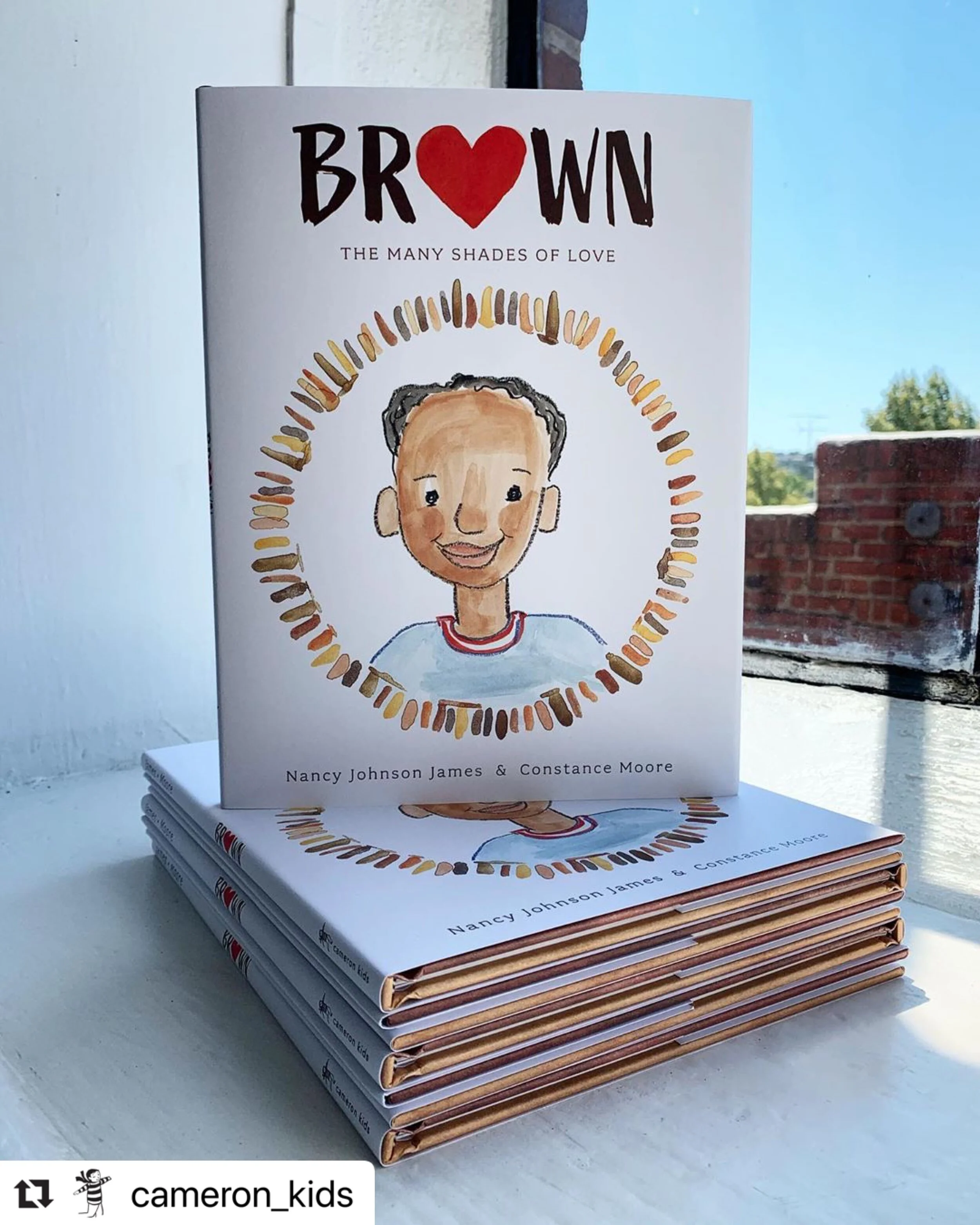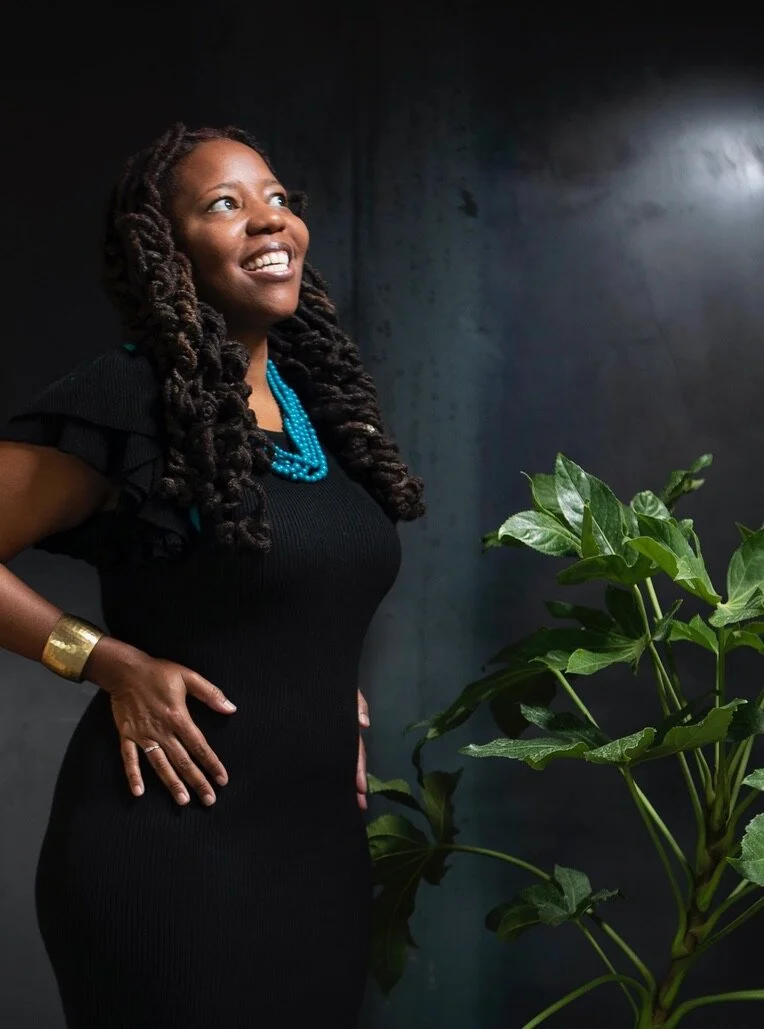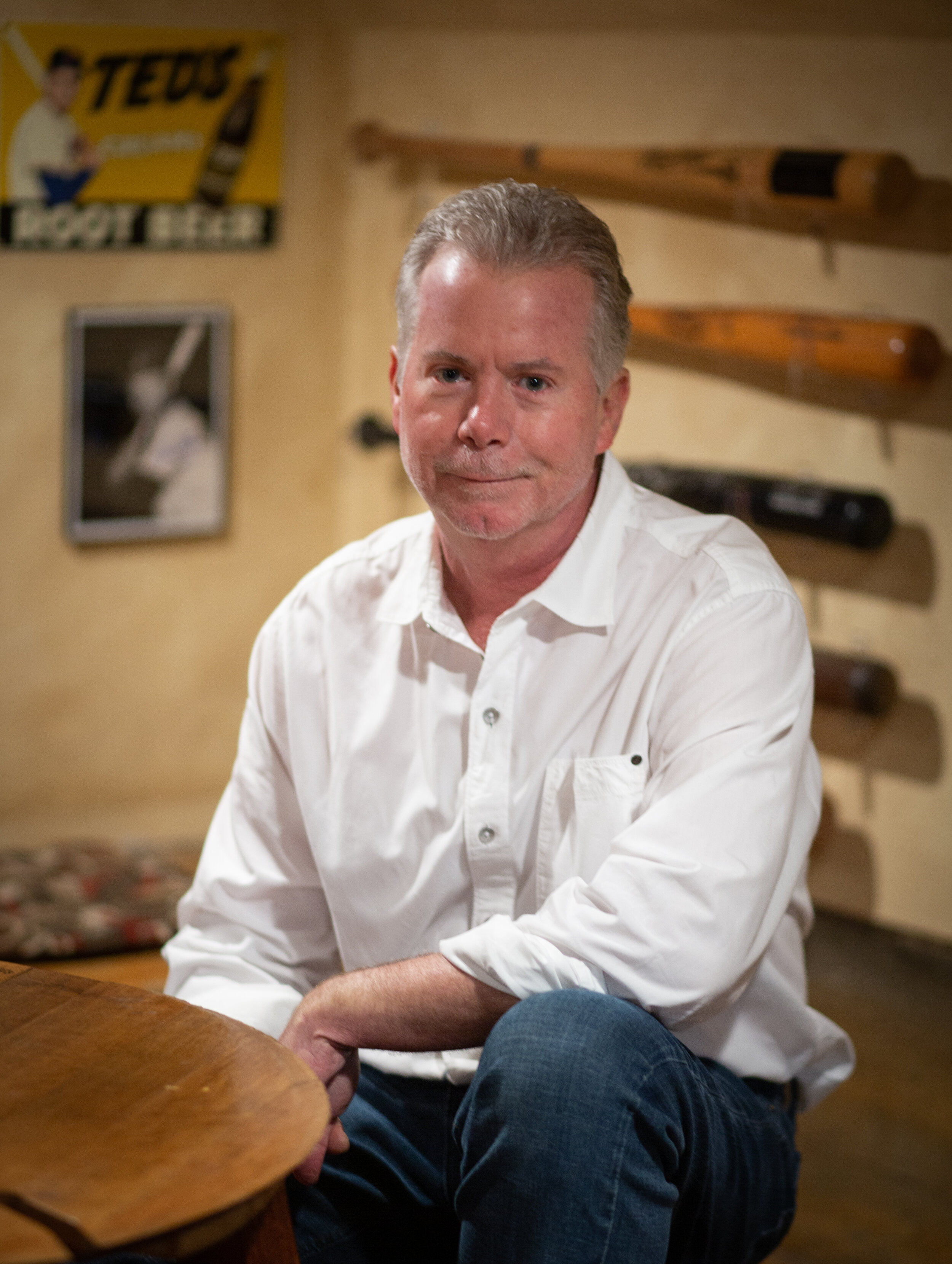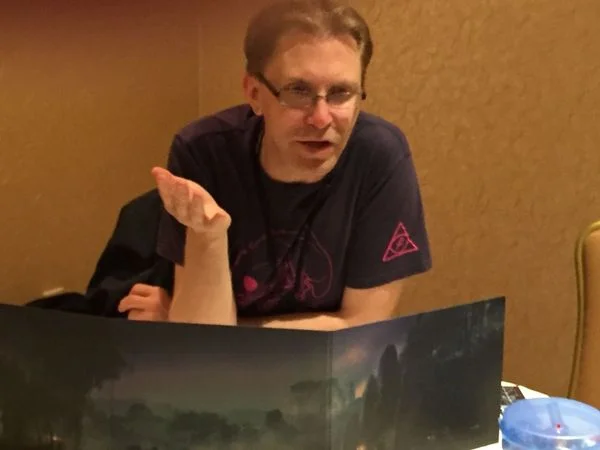Forged Heroes & Queen Drama: Interview with Brian and Scott Palmer
Meet creative arts power couple and newlyweds, Brian and Scott Palmer. Brian is the author of almost 40 novels, including his most recent, New Shoes, the first of The Saint-Moreno Novels, an urban fantasy series about two people who might just save the world if they can manage to save one another first. Scott, the founding Artistic Director of the nationally known theater, Bag & Baggage, has directed and produced critically acclaimed theatrical productions across the globe.
Brian and Scott live outside of Portland, Oregon with Mac, whom Brian calls, “the greatest dog in all the world, who moonlights as an international spy and defends the house from ninja assassins.”
Scott and I are old friends from our college years. He used to kick my butt in competitive literary interpretation. In this interview, we discussed process, metaphor, writerly mysticism, and both their next projects.
Kristy Lin Billuni: Tell me how I can enjoy your work right now.
Brian C Palmer: Oh man, there’s a lot going on. I released New Shoes, the first book in the Saint-Moreno series in September, and I’m working to release book two in that series, Coat Tails, in February of 2019.
Scott Palmer: At the moment, I’m not doing a lot of writing; that is something I am leaving to Brian while I focus on directing. I am primarily a theatre director, but am also an adapter of classical work.
KLB: Tell me about the show that’s running at Bag & Baggage now.
SP: As a holiday show, Bell, Book and Candle is both an odd and completely appropriate choice. John Van Druten’s classic allegory of closeted gay life in the 1950s inspired a movie with Jimmy Stewart and also the camp television classic Bewitched! And it is a show about witches and witchcraft, which is odd for Christmas. But it is also a show about community, fear, isolation, and acceptance of one’s self and one’s community. Plus it has a fabulous mid-century vibe, which delights both our audiences and the artists! The show opened Friday November 30th and runs through December 23rd, 2018.
KLB: And Brian, the Saint-Moreno series is your first big move into fantasy, isn’t it?
BCP: Yes, it’s the genre I’ve always wanted to write. Saint-Moreno is an urban fantasy series set in Portland and is about the magical apocalypse and the return of the old Sumerian gods, and the partnership between Vanessa Moreno—a homicide cop descended from monster hunters—and Adam Saint, an alcoholic sorcerer who drinks to suppress the demon he’s possessed by. They do not successfully stop the end of the world, and the series is about them trying to clean up the mess.
KLB: You’re both sort of collaborating with writer heroes right now. Brian, tell us about your forthcoming co-written project.
BCP: I’m writing The Last Promethean with Marie Robinson. It’s mostly a fun adventure about a heroine and her three love interests—a minimum requirement in reverse harem stories—but I’m really happy with how it’s shaping up to have a strong thematic backbone as well. Marie is giving me an interest in harem and reverse-harem romance angles, that I didn’t have before. Working with her, we’ve been exploring a complicated relationship dynamic between three men and one woman, discovering how they all balance one another, why they do and don’t get along, so it’s almost like a thought experiment in polyamory, and of course I love that kind of thing.
KLB: You both have these really sexually fascinating projects! Scott, can you talk a little about Bell, Book and Candle’s playwright?
SP: John Van Druten is one of the most influential playwrights that no one has ever heard of and an un-celebrated figure in queen drama. Jason Zinoman, wrote of Van Druten in The New York Times, “He steered away from grand provocations or state-of-the-nation themes.” But I think his work is full of grand provocations and state-of-the-nation themes; they are just hidden underneath a veneer of wit, sophistication, and charm because that was the only way a closeted gay man in the 1950s could have provocative opinions about the state of the nation without being outed, accused of being a communist, blacklisted, or killed. In Bell, Book, and Candle, Van Druten used a very convenient metaphor for living a closeted gay life in New York in the 1950s: witches. By using the metaphor of witches and warlocks, and by putting his perspective into that of a female protagonist, Van Druten was able to say a number of specific things to his audience: first, that gays have a right to exist; second, that homosexuality is a community even if the broader world doesn’t understand it; third, that being closeted, and the treatment of queer culture by straight culture, creates deep loneliness and emotional shallowness; and, fourth, that being gay (or a witch) is actually really pretty fun.
KLB: How does queerness show up in your work, Brian?
BP: I don’t like reading a soap-box, and I don’t like writing a soap box. I want it to all feel totally natural, like this is just the reality of the world projected into fiction. It’s a given—all different kinds of people, not just straight, white people. I really want to write a story where every single character is somehow queer, and I think that this particular idea would deliver that well, to an audience that really needs more diverse fiction and to see the different kinds of hero you can be that has nothing to do with whether you’re a boy, a girl, somewhere in between, or feel like you’re just not on that spectrum at all. That will probably be the project that takes the place of The Last Promethean once that series (three books) is finished. I’m really interested in pushing some boundaries regarding traditional lead characters. In Saint-Moreno, I’ve got two POV characters in third person, which is just not done in Urban Fantasy right now and I think readers have found it refreshing for the most part. I want to write characters of color and do so in a way that doesn’t feel inauthentic or forced, and I want to bring a lot more gender diversity to fiction in the same way.
KLB: Do you think it’s important to think about process--how we write--in addition to the actual writing project?
BCP: I’m very, very process driven, and in fact, part of what I do as a side hustle is consult with micro-publishers about how to produce more books, and help them develop templates for genre and even sub-genre specific books. I kind of train outliners, basically.
KLB: Can you describe your approach?
BCP: Up until this project, I had a really clear kind of formula for writing. And by formula I mean that I had a series of questions that helped me zero in on exactly what I needed to know.
KLB: How has your process been different with the current project?
BCP: With New Shoes, I learned that there are kind of two levels of stories. One is a predictable, formula driven kind of story—like almost every romance ever written—and the other is something living and organic that struggles and squirms as you write it, and that the more real your characters get the more they fight you.
KLB: Is that a good thing? Fighting with your imaginary characters?
BCP: Until I wrote New Shoes, I considered a lot of that to be kind of writerly mysticism and nonsense. However, I honestly wasn’t satisfied with New Shoes until I started getting into those fights with Vanessa and Adam. If your characters aren’t fighting you, I think maybe you don’t know them well enough. I have this theory that every story is an argument between the author and the characters. You know what they need, where they need to go, how they need to grow, and they need to give you the finger at every turn. So, as the author you keep throwing them challenges and obstacles to steer them where you want them to go until finally they crack and have to make a little bit of growth, grudgingly, because otherwise they won’t survive.
KLB: It sounds like you work really hard on your stories, Brian.
BCP: I am a relentless workhorse writer. I work hard during the day, and my indulgence is probably just putting down the keyboard at the end of the day, when Scott gets home, and giving myself permission to be done so that we can spend time together.
SP: I do my best writing in my pajamas and with wine.
BCP: I write every single day, usually during any hours that Scott isn’t home. That’s most often a ten-hour day, and I write for eight of those in some capacity at least, though that’s normally spread among multiple projects.
SP: I usually write in long, focused blocks of time rather than occasionally or on any kind of regular schedule.
KLB: Can you talk a little about the process of adapting a play, Scott?
SP: There is a pretty significant difference between being a “writer” and being a playwright, plus there is a huge difference between being a playwright and being an adapter. The processes are radically different, really, especially in scale and scope. I am mostly interested in adaptations; my personal writing is focused on making classical stories seem new again. Of particular interest to me is reconnecting classical stories (which are almost always riddled with homophobia, racism, and misogyny) more deeply rooted in social justice. It’s what I often call the “bait and switch;” audiences think they are coming to see a good old fashioned production of Romeo and Juliet, but when they arrive, the production actually merges Shakespeare with an ancient Sunni Muslim poet’s epic tale of star-crossed lovers! Fun and educational!
KLB: Scott, what’s next for you?
SP: After Bell, Book and Candle, I’ll be directing a world premiere adaptation of Shakespeare’s The Winter’s Tale as part of our “Problem Play Project (PPP).” PPP is a three year program that commissions emerging playwrights of color to adapt one of Shakespeare’s so-called problem plays (those plays that don’t fit comfortably within either category of comedy or tragedy) with an equity lens.The first commission is called The Island In Winter and is an exploration of Shakespeare’s play about family, jealousy, and betrayal set in post-revolutionary Cuba. The playwright, Carlos Trujillo, is local to Hillsboro and, as an out actor and artist, has a powerful perspective on the Cuban-American experience. The Island In Winter opens in March of 2019.
KLB: Brian, tell us a little more about the forthcoming Last Promethean with Marie Robinson.
BCP: It’s a post apocalyptic series of fantasy novels for a more YA audience with about a world where the Greek gods have come back to power after taking back the fire that Prometheus stole, and the last scion of that fire, who ends up waging a war for the freedom of humanity. It’s really become about the dangers and limitations of absolute power, and that even when it seems people are as oppressed as they can possibly be—the Olympians in this series are vicious, and cruel, and very, well, true to their mythology—there will always be resistance, and that kind of oppression is the pressure that forges heroes and forces people to act and change their situation. It has a lot of really cool mythology and a pretty dark tone to it. Those books are coming out January of 2019.
I coax sexy writers like Scott and Brian to reveal their creative secrets and processes in writer interviews to inspire you:
Get tickets now for Bell, Book and Candle and The Island In Winter on the Bag & Baggage website.
Read about Scott’s adaptation of Romeo and Juliet, Romeo&Juliet/Layla&Majnun.
Buy Brian’s books on his website and his Amazon author page.
I cultivate sexy, bold, free writers in stimulating, one-hour private sessions. I also write essays and short stories about sex, writing, and sometimes pigeons.
Read my writing.
Flirt with me on Twitter.
Get my cafe reviews & reviews of me on Yelp.
Share books on GoodReads.
Schedule your free private session.













